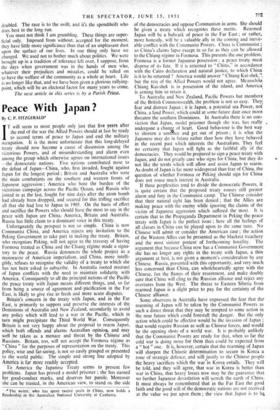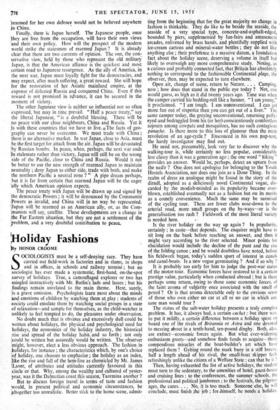Peace With Japan ?
R C. P. I IlL6LKALD* IT will seem to most people only just that five years after the end of the war the Allied Powers should at last be ready to accord terms of peace to Japan and end the military occupation. It is the more unfortunate that this long-delayed treaty should now become a cause of dissension among the victorious Powers, and of misunderstanding and alarm even among the group which otherwise agrees on international issues —the democratic nations. Five nations contributed most to the defeat of Japan—China, who, first invaded, fought against Japan for the longest period : Britain and Australia who were the main combatants on the southern and western fronts of Japanese aggression ; America who bore the burden of the victorious campaign across the Pacific Ocean, and Russia who joined in at the last, fought for nine days ,after the atom bomb had already been dropped. and secured for this trilling sacrifice all that she had lost to Japan in 1905. On the basis of effort and sacrifice the Powers who should have the most to say in the peace with Japan are China; America, Britain and Australia. Russia has little claim to a dominant voice in this treaty.
Unfortunately the prospect is not so simple. China is now Communist China, and America rejects any invitation to the Peking Government to take part in making the treaty. Britain, who recognises Peking, will not agree to the travesty of having Formosa treated as China and the Chiang regime made a signa- tory to the peace. Russia denounces the whole project as a manoeuvre of American imperialism, and China, more intelli- gibly, refuses to recognise the validity of a treaty to which she has not been-asked to subscribe. In Australia rooted mistrust of Japan conflicts with the need to maintain solidarity with America. Consequently to all the principal nations of the Pacific the peace treaty with•Japan means different things, and, so far from being a source of agreement and•pacification in the Far East, is likely to give rise to fresh and more acute disputes.
Britain's concern in the treaty with Japan, and in the Far East, is primarily to support and preserve the interests of the. Dominions of Australia and New Zealand, secondarily to avoid any policy which will lead to a war in' the Pacific, which in turn might precipitate the Third World War. Consequently Britain is not very happy about the proposal to rearm Japan, which both offends and alarms Australian opinim and may well be taken as a menace and threat by the Chinese and Russians. Britain, too, will not accept the Formosa regime as "China" for the purposes of representation on the treaty. This policy, wise and far-seeing, is not so easily grasped or presented to the world public: The simple and strong line adopted by
America is far more readily accepted. To America the Japanese Treaty seems to present few problems. Japan has proved a model prisoner ; she has earned her good-conduct marks, and deserves her parole. Moreover she can be trusted, in the American view, to stand oi, the side
• The writer. who has spent twelve yeirs in China, now holds a Readership in the Australian National University at Canberra.
of the democracies and oppose Communism in arms. She should be given a treaty which recognises these merits. Rearmed Japan will be a bulwark of peace in the Far East ; or rather, more honestly, will be a valuable ally in the coming and inevit- able conflict with the Communist Powers. China is Communist • so China's claims lapse except in so far as they can be allowed to the Chiang regime in Formosa. This presents the one problem. Formosa is a former Japanese possession ; a peace treaty must dispose of its fate. If it is returned to "China. ' in accordance with the Cairo declaration and natural justice. to which China is it to be returned ? America would answer " Chiang Kai-shek:el but the rest of the Allied Powers would not agree. Meanwhile Chiang Kai-shek is in possession of the island, and America, is arming him to retain it.
To Australia and New Zealand, Pacific Powers but members' of the British Commonwealth, the problem is not so easy. They fear and distrust Japan ; it is Japan, a potential sea Power, not China, a land Power, which could at some future date once more threaten the southern Dominions. In Australia there is no con- viction that Japan, model prisoner though she was, has really undergone a changp of heart. Good behaviour is the best way to shorten a sentce and get out of prison ; it is what the Japanese may do in future rather than how they have behaved in the recent past which interests the Australians. They feel no certainty that Japan will fight as the faithful ally of the democracies. They would be prepared to sign a peace treaty with Japan. and do not greatly care who signs for China. but they do not like the ternfs which will allow and assist Japan to rearm. As doubt of Japan is far more widespread than fear of China, the question of whether Formosa or Peking should sign for China does not rouse much interest in Australia.
If these perplexities tend to divide the democratic Powers, it is quite certain that the proposed treaty rouses still greater alarm and fury in the Communist camp. The Chinese consider that their natural right has been denied ; that the Allies are making peace with the enemy while ignoring the claims of the victim of Japanese aggression which suffered the most. It is certain that to the Propaganda Department in Peking the peace treaty with Japan is the perfect issue ; here all the feelings of all classes in China can be played upon to the same tune. No Chinese will admit or consider the American case ; the action of the Western Allies can be presented as the blackest treachery and the most sinister portent of forthcoming hostility. The argument that because China now has a Communist Government she has no longer any rights in the treaty with Japan, a thin argument at best, is not given a moment's consideration by any Chinese. Russia. presented with this opportunity, and very much less concerned than China, can wholeheartedly agree with the Chinese. fan the flames of their resentment, and make doubly sure that China will cling to the Russian alliance and reject any overtures from the West. The threat to Eastern Siberia from rearmed Japan is a slight price to pay for the certainty of the Chinese alliance.
Some observers in Australia have expressed the fear that the rearming of Japan will be taken by the Communist Powers as such a direct threat that they may be tempted to some action in the near future which could forestall the danger.. But the only action which could be effective would be the invasion of Japan : that would require Russian as well as Chinese forces, and would be the opening shots of a world war. It is probably unlikely that the Communist Powers are ready for that, when so far the cold war is doing more for them than could he expected from a " hot " one. It is, however, certain that the rearming of Japan will sharpen the' Chinde determination to secure in Korea a zone of strategic defence, and will justify to the Chinese people the heavy 'sacrifices which the war in Korea entails. They will be told, and they will agree, that war in Korea is better than war in China, that heavy losses now may be the guarantee that no further Japanese devastation will scorch the earth of China. It must always be remembered that in the Far East the good faith and the good will of the democratic nations are not received at the value we put upon them ; the view that Japan is to bq 'rearmed for her own defence would not be believed anywhere in China.
Finally, there is Japan herself. The Japanese people, once they are free from the occupation, will have their own views and their own policy. How will the prospect of the modern world strike the statesmen of rearmed Japan ? It is already clear that there are two currents of opinion. The one, the con: servative view, held by those who represent the old military Japan, is that the American alliance is the quickest and most certain road to Japanese resurgence. As the ally of America, in the next war, Japan must loyally fight for the democracies, and may expect, after much suffering, a great reward. She will hope for the restoration of her Asiatic mainland empire, at the expense of defeated Russia and conquered China. Even if this reward is not promised in advance, it can be secured in the moment of victory. The other Japanese view is neither so influential nor so often expressed, but may in time prevail. " Half a peace treaty," say the liberal Japanese, " is a doubtful blessing. There will be no peace with our close neighbours, China and Russia. Yet it is with these countries that we have to live..The facts of geo- 'graphy can never be overcome. We must trade with China ; 'there is no alternative market. In war Japan, close to Asia, must be the first target for attack from the air. Japan will be devastated by Russian bombs. In peace, when, perhaps, the next war ends en stalemate rather than victory, Japan will still be on the wrong side of the Pacific, close to China and Russia. Would it not be better to use the new strength of rearmed Japan to maintain neutrality ; deny Japan to either side, trade with both, and make the northern Pacific a neutral zone ? " A pipe dream perhaps, but it is far from certain that rearmed Japan will be the eager !ally which American opinion expects.
, The peace treaty with Japan will be drawn up and signed by :the democratic Powers ; it will be denounced by the Communist Powers as invalid, and China will In no way be represented. !Japan will be rearmed as an American ally, or, as the Com- munists will say, satellite. These developments are a change in the Far Eastern situation, but they are not a settlement of the problem, and a very doubtful contribution to peace.



































 Previous page
Previous page